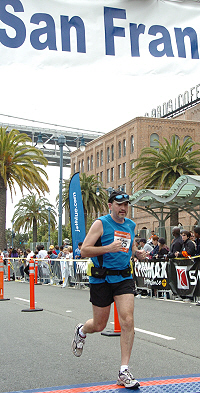Ninth Circuit Sends Mixed Signals In Strip Search Case
August 27, 2008 by David Newdorf
Filed under Around the Courthouse
There were three opinions written — a majority, concurrence and dissent — on the 2-1 Ninth Circuit panel that ruled against San Francisco on the constitutionality of its former jail strip search policy. As the Legalpad blog said in its headline: 9th Plays Jail Strip Searches Left, Right & Center. Although on the surface, the Court did not upset 20 years of its strip search jurisprudence, two of the three panel members urged the Court to reject its precedents as inconsistent with the Supreme Court’s 1979 decision in Bell v. Wolfish.
The case is Bull v. City and County of San Francisco (9th Circuit August 22, 2008). For a more detailed analysis, read Ninth Circuit Strip Search Law In Flux After Bull Decision. Read the three opinions for yourself at the Section 1983 Civil Rights Law Reporter, a companion blog to Newdorf Legal.
Jail Strip Search Update
An en banc panel of the Ninth Circuit reversed the panel decision in September 2010. For the latest update on the Bull case, read about the 9th Circuit en banc decision.
For all of your litigation questions, contact Newdorf Legal, a San Francisco business litigation law firm.
What Every Litigator Can Learn from the Four Stages of a Marathon
August 12, 2008 by David Newdorf
Filed under Lawyers & The Law
 People sometimes ask me what I think about while out on long runs. Before the sore muscles and aching joints recede into memory, I thought I’d share some of my musings from the San Francisco Marathon on August 3, 2008. It occurred to me that long-distance running and litigation have a lot in common. So while bounding through Potrero Hill, on my way to Dogpatch and AT&T Park, I organized my thoughts into a list. I call it “What Every Litigator Can Learn from the Four Stages of a Marathon.”
People sometimes ask me what I think about while out on long runs. Before the sore muscles and aching joints recede into memory, I thought I’d share some of my musings from the San Francisco Marathon on August 3, 2008. It occurred to me that long-distance running and litigation have a lot in common. So while bounding through Potrero Hill, on my way to Dogpatch and AT&T Park, I organized my thoughts into a list. I call it “What Every Litigator Can Learn from the Four Stages of a Marathon.”
The four stages are: Training, The Starting Line, Hitting the Wall, and The Finishing Kick.
1. Training. “Train how you fight.” I learned this phrase from an Army lieutenant, but the concept is universal. When soldiers train for battle, they don’t wear comfy sweats. They wear full battle gear, including those heavy backpacks. At finals time in law school, I used to see my classmates flipping through index cards with phrases like “Promissory estoppel” on one side, and definitions on the other. Very useful if you’re taking a test about flipping flash cards. But if you’re taking an essay exam, better to go into the library, pull out old exam questions, and start writing – with a timer, of course. When you do it this way – when you prepare by doing the same things, in the same way, as you would during the race (or the test or whatever event you’re training for) – you take your preparation to the next level. You learn the material at the muscular, maybe even cellular, level.
- Training for a marathon? Don’t do it at the track, do it on the course. Come race day, I had run ever mile of the course multiple times. It was useful, as I’ll explain in Stage 4, because I could visualize the road ahead. For litigators, that means do moot courts and mock trials, or at least roundtable your case with a room full of colleagues. When you set up the moot court, make it realistic. Wear a suit – you will in court – and stand up. You don’t learn to think on your feet while sitting in a chair. Recruit three or more “judges” who’ve read the briefs and are ready to pepper you with smart, tough questions. You’ll know you prepared properly when the real argument was easier than the practice one.
- 2. The Starting Line. It’s a lot of fun when the starting gun fires and the spectators cheer you on. You feel great! You run faster! You can keep this up forever! But most distance races like most lawsuits are not all flat and easy. There are hills coming, especially in San Francisco. But more of that in a moment. For now, enjoy! Celebrate your victories along the way. You passed the 13.1 mile marker — half way done and ahead of pace? Good job! Congratulate the runner next to you and suck down a tasty Double Latte (the flavored PowerBar sports gel, that is). Make sure to reward yourself – and your team –with recognition for a job well done at every stage. Whenever possible, I celebrate the victories before learning the outcome. You could lose that motion, and a “defeat” party just isn’t as much fun as a victory party. If things are going really badly, I celebrate the small wins. The judge granted my unopposed request for three extra pages on the brief! Yahoo!
- 3. Hitting the Wall. Now it’s mile twenty-something. The adoring crowds are gone, along with your energy. You’re passing through a gritty industrial district. What seemed like a personal record in the making early in the race is turning into a disaster. Or it’s well after midnight, your office staff left hours ago, your colleague’s relaxing on a beach in Hawaii, and the brief is due tomorrow. Will you even finish?
- Every runner reaches a point of exhaustion and fatigue where the temptation is to take the easy way out. It happens in every race and this time was no different. My desperation peaked at miles 20 to 22, when every inch of me was screaming to stop. In the mind vs. body battle for dominion, it seemed like a palace coup was about to succeed. My walking “breaks” became longer and longer until finally I was just walking. I thought I had nothing left.
- Runners call this “hitting the wall” – the dreaded point in the race when your muscle glycogen stores are depleted and a feeling of overwhelming fatigue engulfs you. You almost cannot take another step. Litigators don’t have a name for it, but the same feeling is known to develop over the course of a long case.
- 4. The Finishing Kick. But wait. Is that the 22-mile marker ahead? Yes! Because I know the course backwards and forwards, I know that I can almost see the Bay, which means I can almost see the Ferry Building – and that’s the finish line! I look at my watch and note that I’ve been running for a little more than 4-1/2 hours. I do the math, and realize that I can still make my projected finish time. Somehow, somewhere, I find the energy to start running again. I visualize myself on the winner’s podium. I know the winners finished before I was half-way done, but logic has nothing to do with it. In my mind, the theme song from “Rocky” blares. This is my finishing kick.
- And like the song that repeats over and over until I cross the finish line, it’s all in my head. And that’s the point. Long-distance running and litigation are about mental challenge, mind over matter. Sure, a marathon or a trial requires training and preparation. You’d be an idiot to go out and run 26.2 miles if you haven’t run four laps around the track since high school. But getting to the finish line is more about mental toughness than physical conditioning. The tests come at every stage. It may come before sunrise on a Sunday when the alarm clock goes off. Do you hit the snooze button or do you get out of bed for your training run? Do you settle for the brief that’s “good enough,” or do you keep searching for the winning argument?
- It’s about overcoming the voices in your head telling you: “It’s too hard,” “You can’t do it,” “What were you thinking?” The same mental toughness that powers you to the finish line helps you deal with cantankerous counsel, contrary judges, and demanding clients.
- So that’s what I was thinking as I ran down from Potrero Hill toward the waterfront. And by the way, I finished my third marathon in 5:28. Not a time for the record books – unless you happen to be me, in which case it is 11 minutes faster than my best previous time.
For all of your litigation questions, contact Newdorf Legal, a San Francisco business litigation law firm.









